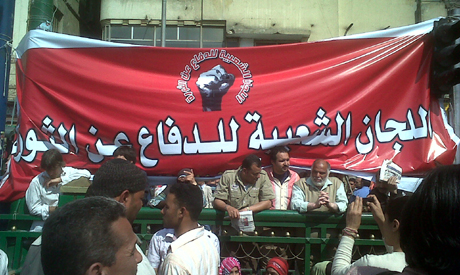
Popular Committees launching their first general conference in Tahrir Sqauer on Friday 22 April.
The Popular Committees for the Defence of the Revolution (PCDR) began their first general conference in Tahrir Square at 1:00pm after Friday prayer. The conference was announced weeks ago “to announce the political orientation [of the PCDR] during the next phase [of the revolution] and to expand the techniques of joint action, cooperation with other committees and the introduction of other initiatives.”
A stage was erected on the eastern side of the square close to Mohamed Mahmoud Street. Hundreds gathered around the stage which was surrounded by signs identifying the different committees from Kafr Shukr, Boulaq, Giza, Alexandria, Imbaba and Al-Omraniya among others.
Members of the Egyptian Public Security Forces (EPSF) were present in the square, wearing arm bands to distinguish themselves. The EPSF have been continuing in their role as protectors of the streets in the absence of security. Bystanders, upon discovering the cause of the gathering, began to question the need for such committees, arguing that the military and the police together have ensured the country’s security.
Members of these committees have been gathering every Monday at the Centre for Socialist Studies in Giza as part of the PCDR’s central committee for organisation. They’ve had heated debates for the past two weeks on the group’s political focus, the recruitment of new members, the venue of their conference and even the creation of banners and signs. They’ve leafleted many cities across the country.
The stage was host to musicians, poets and political speakers trying to reignite the spark that was Tahrir. Though the crowds energy was strong at times, particularly during the musical performances, the conference’s message seemed to fall on deaf ears. Many members of the crowd were not aware of the gathering’s purpose.
A committee member from Giza explained that it was the Muslim Brotherhood who had pulled out of the protest arena in order to paint protesters as outlaws, nevertheless he believed that people wouldn’t have come to Tahrir had they been satisfied with the progress thus far.
Committee members handed out leaflets which outlined their founding principles which focused on the trial of the corrupt, the return of illegally appropriated funds to the people, the dismantling of local councils, the election of governors and all local officials, an end to military trials and the dismantling of the new National Security apparatus, intended to replace the reviled State Security apparatus.
The founding principles highlighted the PCDR’s main roles in the coming interim period: namely, to educate and spread the principles of democracy to the people, to facilitate the “supervision and the participation by the people in societal affairs” and involvement of the Egyptian people in the nation building process.
Within an hour of the conference’s commencement, people began chanting against def-facto leader Field Marshall Tantawi and corruption as the conference seemed to fizzle out.
Short link: